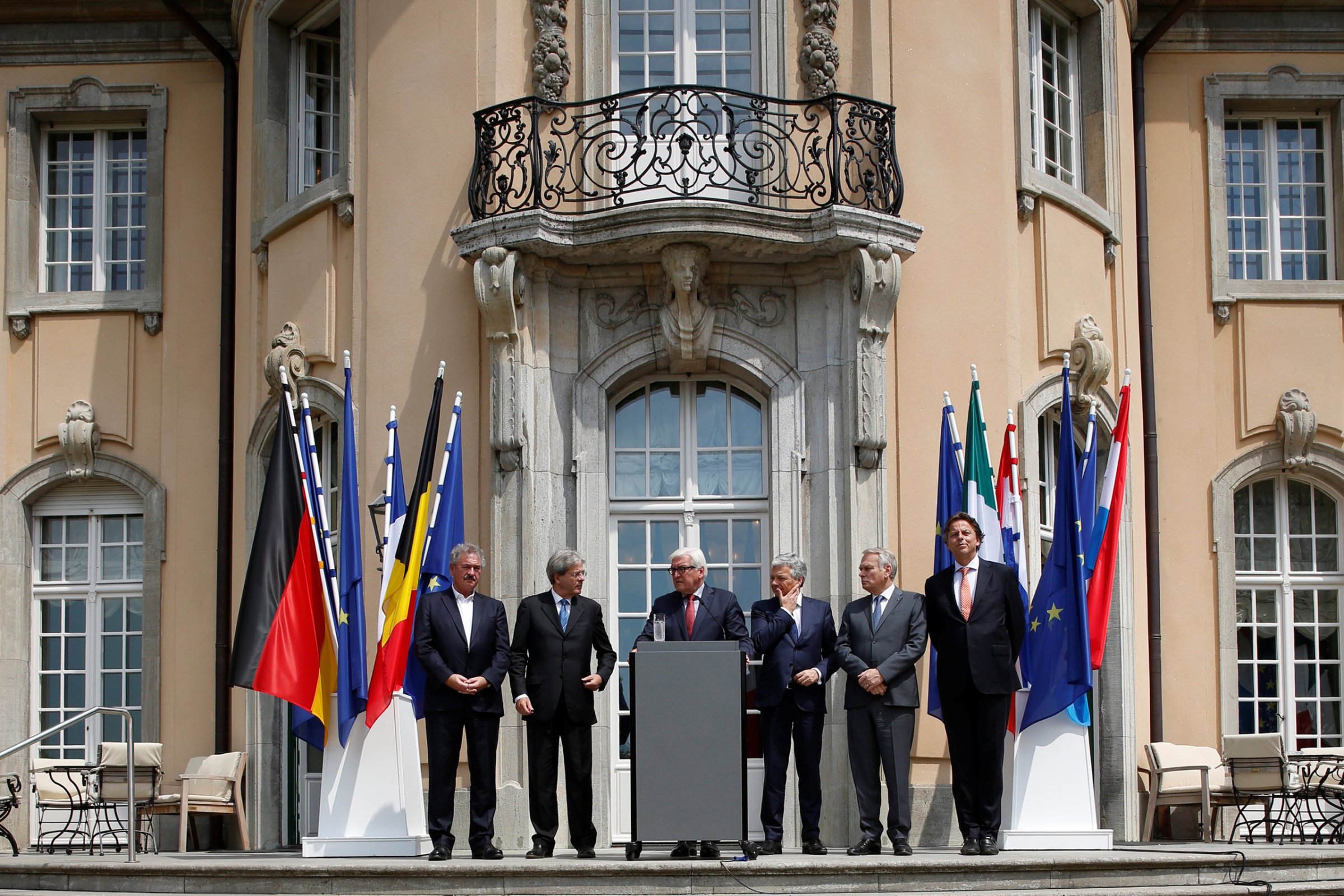
Introspection has never been one of the European Union’s strong points. For years the bloc has lurched from one crisis to the next, promising time and again to heed the growing mistrust of its 500 million citizens, only to return to the business of internal squabbling as another emergency emerges on the continent.
This time, it’s different. With Britain voting to leave the E.U, a vital part of the union is splintering off and ‘business as usual’ is no longer an option. John Kerry, the U.S. Secretary of State, underscored that Monday with his emergency visit to London and Brussels.
“The departure of the second biggest economy and of one of two significant military powers is a huge blow in itself,” says Stefan Lehne, a Visiting Scholar at the Carnegie Europe think-tank. “This is made worse by the reputational damage which ensues when the world’s most successful integration process is suddenly thrown into reverse.”
The bloc’s founding members appeared finally to acknowledge that the status quo could not continue, in a joint statement at the end of last week. “Neither a simple call for more Europe nor a phase of mere reflection can be an adequate answer,” the foreign ministers of France, Germany, Belgium, Luxembourg, Italy and The Netherlands said. Or as Gerard Araud, the French ambassador to Washington, put it in a Tweet not long after the referendum result was known:
Now to the other Members states to save the EU from unraveling which excludes business as usual, especially in Brussels. Reform or die!
— Gérard Araud (@GerardAraud) June 24, 2016
But exactly what that reform would look like is an open question. The immediate priority for the E.U. is trying to calm the panic and find as smooth a path as possible for Britain’s thorny exit negotiations, while keeping in mind the impact it will have on public opinion in other nations. Euroskeptic parties are gaining influence across the bloc, taking advantage of the E.U.’s perceived failures in dealing with the eurozone crisis and the arrival of more than a million people seeking sanctuary from war and poverty last year.
Once the messy divorce proceedings are underway, the business of rebuilding the E.U’s reputation begins. Brussels needs to find a new narrative capable of matching the singular nationalist vision of populists, says Chris Bickerton, a lecturer at Britain’s Cambridge University and author of The European Union: A Citizen’s Guide. “The euroskeptics are the ones most on the ball in terms of putting forward their vision of Europe, and the E.U. institutions have to come up with something convincing to rebut that.”
It’s not clear, however, what that will be — or who might suggest it. The E.U.’s management structures are complicated, and there is not one single person who can lead the push to define a narrative. The top leadership is also divided on the question of the E.U’s future. Federalists like Jean-Claude Juncker, President of the E.U.’s executive branch, believe closer economic and political integration between the member states will bind the union, eventually helping revive economies across the bloc and thus restoring public trust.
That vision is increasingly at odds with other senior E.U. officials and the member states themselves, many of whom see the bloc less as a utopian project and more as a means to an end. “E.U. countries will pursue much more British-like policies in which they look for concrete benefits from European integration and not for a quasi-religious or quasi-ideological movement towards the construction of Europe,” says Michael Leigh, a senior fellow at the German Marshall Fund think tank.
The lack of shared vision not only hampers the grand goal of defining the European dream, but many other areas of E.U. policy. The 27 remaining member states have very different histories and cultures, and range from the socially liberal Scandinavian nations to the more religious and conservative South and East. Denmark, for example, legalised same-sex unions in 1989, but Malta only allowed its citizens to divorce in 2011. These gulfs became apparent during the refugee crisis, when Hungary and Slovakia claimed the influx of Muslim refugees would threaten their culture. The divide between the former Soviet nations and the rest of Europe, meanwhile, often overshadows negotiations of the E.U.’s response to Russian aggression.
Coming up with a unified foreign policy is perhaps the E.U’s greatest challenge of all, but Carnegie Europe’s Stefan Lehne, says it is even more important than ever now that the bloc has lost one of its most forceful foreign players. “The U.K. has been the member state with the most global outlook,” he tells TIME. “Without it there is the risk of narrowing the E.U’s focus to regional challenges, which needs to be resisted.”
The E.U. leaders are well aware of this need to send a signal to the rest of the world, with the bloc’s top diplomat Federica Mogherini on Sunday insisting that the union was up to answering the challenge of the British referendum.
But the E.U. has never been very adept at heeding the warning signals before. Similar calls for reform were heard after populist parties saw a 50% leap in representation in the May 2014 European Parliament elections. Yet the result in Britain last week — and the subsequent calls for more referenda elsewhere on the continent — shows just how little changed.
Only time can tell if Britain’s vote ends up being a wake-up call, or a death knell.
More Must-Reads From TIME
- The 100 Most Influential People of 2024
- The Revolution of Yulia Navalnaya
- 6 Compliments That Land Every Time
- What's the Deal With the Bitcoin Halving?
- If You're Dating Right Now , You're Brave: Column
- The AI That Could Heal a Divided Internet
- Fallout Is a Brilliant Model for the Future of Video Game Adaptations
- Want Weekly Recs on What to Watch, Read, and More? Sign Up for Worth Your Time
Contact us at letters@time.com